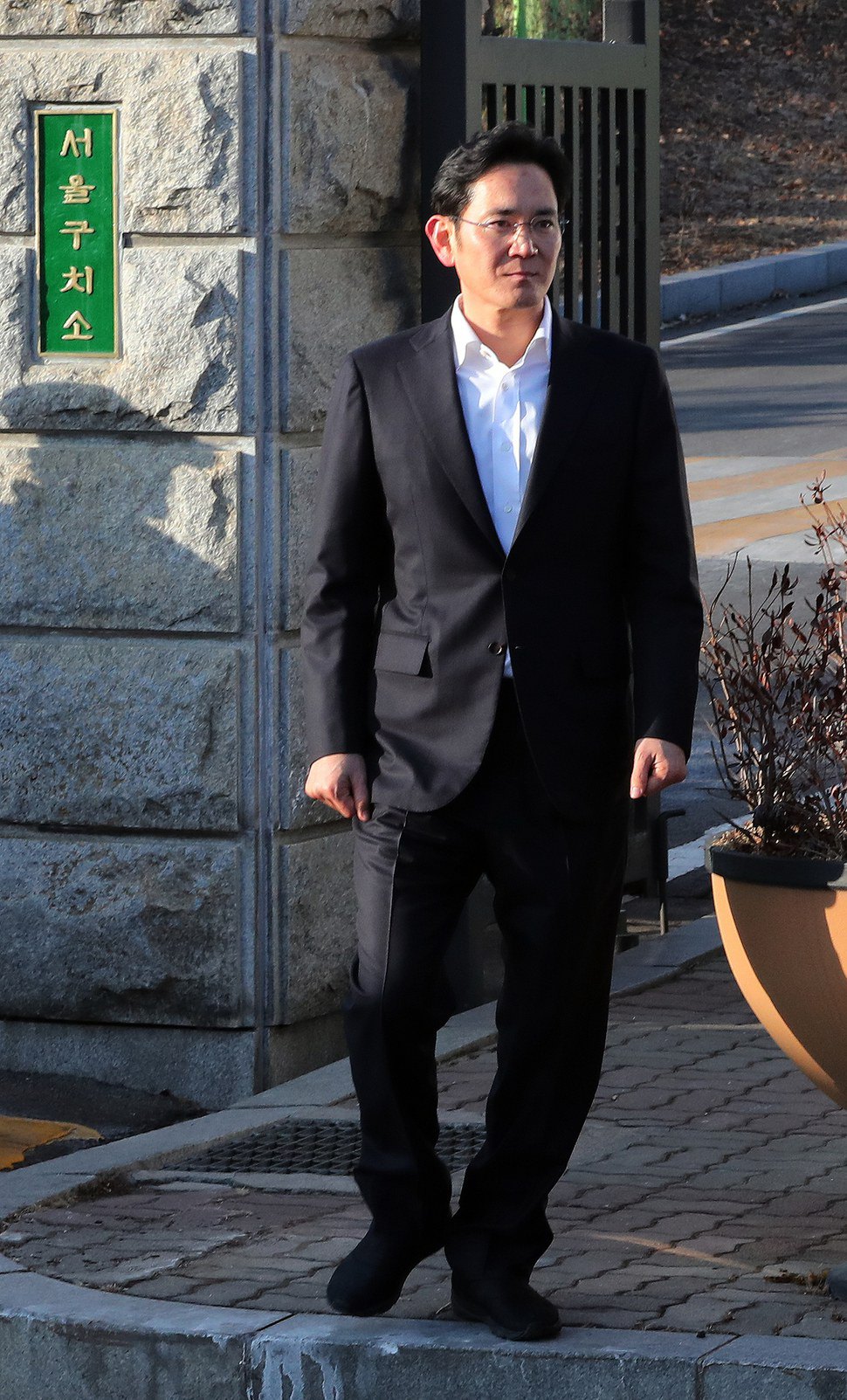Posted on : Feb.6,2018 18:15 KST
Modified on : Feb.6,2018 18:53 KST
 |
|
Samsung Electronics Vice Chairman Lee Jae-yong leaves the Seoul Detention Center in Uiwang, Gyeonggi Province after he was giving a suspended prison sentence by an appeals court on Feb. 5. (by Kim Kyung-ho, staff photographer
|
Samsung Electronics Vice Chairman Lee Jae-yong was freed on Feb. 5 by an appellate court ruling. Hon. Judge Jeong Hyeong-sik of Seoul High Court’s 13th criminal division found Lee not guilty of the key charges in his indictment – namely the offering of bribe money to former President Park Geun-hye and Choi Soon-sil – and sentenced him to two years and six months in prison suspended for four years.
Whereas the first court saw the case as the “epitome of government-business collusion,” the appellate court deemed it a case of the President coercing Samsung management. Concluding that the money had not been given in the expectation of anything in return, it overturned most of the first court’s conclusions about Lee requesting assistance with the Samsung management rights succession. It also denied any evidentiary powers for Ahn Jong-beom’s work notebook or Kim Young-han’s work diary.
As a ruling, this is a far cry from the judgment passed in the minds of the South Korean public, who are all too aware of the diary’s content from the press. There are also questions about why these evidentiary law principles seem to get applied specifically to Samsung’s owners over the generations, and whether it is really appropriate to free someone on a suspended sentence while acknowledging 3.6 billion won (US$3.3 million) worth of embezzlement and bribery charges. This may go down in the memories of South Koreans as an unusual case of “hereditary acquittal.”
The court concluded that the case was a matter of the “foremost political leader coercing Samsung Group executives,” while Park’s confidante Choi Soon-sil “pursued private gains out of a misguided sense of maternal affection.” It also ruled that the defendant “could not easily refuse the two’s demands and was passively led into offering bribes.” In other words, the court basically agreed with everything Lee’s defense team has been claiming from the start. As an extension of this, the court essentially concluded that Samsung’s management succession could not be viewed as a “specific circumstance” or the subject of an implicit request.
It’s not especially convincing to suggest that Lee simply handed over billions of won in response to “coercion” from the President without any specific circumstances behind it. It’s also hard to comprehend how the court could acknowledge a specific circumstance that did have a significant effect on Lee’s acquisition of control – namely the Samsung C&T and Cheil Industries merger – and then rule that there was no evidence of the bribes being intended to pave the way for the management rights succession.
How are we supposed to explain the full-scale mobilization of government agencies like the offices of the Blue House Senior Secretaries for Civil Affairs and Policy Coordination, the Fair Trade Commission, and the National Pension Service (NPS) to ensure the merger’s success, to the point where Lee was meeting personally with NPS officials? Ever since chairman Lee Kun-hee’s Everland and Samsung SDS incident, it has been common knowledge that Samsung has used all sorts of expedients for the sake of its succession, and the merger was clearly part of that. In denying this, the court showed some distance from common sense.
The court’s claim that it was “difficult to find evidence of typical government-business collusion such as the provision of public funds using taxpayer money” was also difficult to believe, especially given the enormous losses caused for the public’s post-retirement funds in the National Pension. The same goes for the argument that money used for equestrian support was a “component of social contribution activities.” This, together with the fact that the court gave a suspended sentence despite acknowledging a serious crime with the misappropriation of 3.6 billion won (US$3.27 million), suggests the court is going to have a hard time avoiding charges that it concocted its arguments deliberately for the sake of leniency. This case calls for a strict higher court ruling – if only to restore trust in the judiciary.
Please direct questions or comments to [english@hani.co.kr]






